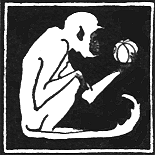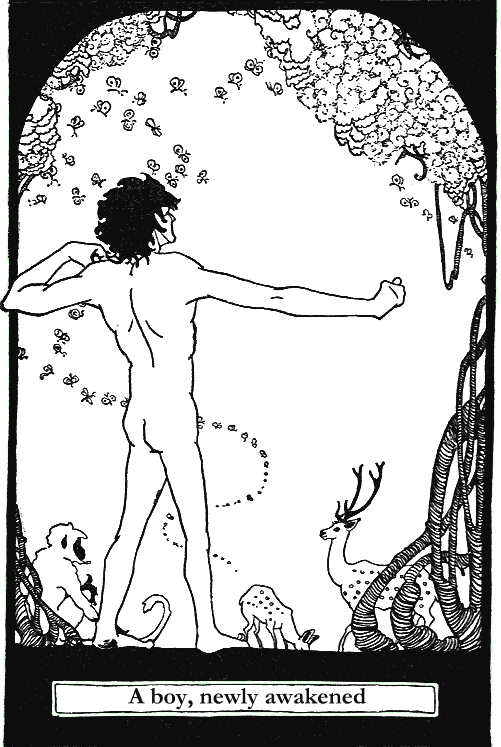 |  |
Wild at Heart Homepage | Contents | Prologue
CHAPTER I
THE LOST GARDEN
1

The lost garden was very peaceful on that afternoon in mid-March--the mellow time when the balance trembles between the cold weather and the hot. The sun, still kindly and without foretaste of his summer ferocity, was veering early westward, and already the shadow of the Ridge had covered half the clearing. A rough oval, this clearing, in which the lines and furrows of former cultivation showed but feebly. The grass, cropped clean by the deer, had the appearance almost of shaven turf, strewn with a careless pattern of scarlet dhak blossoms and trellised with the shadows of thin branches. Trees drooped yearning boughs toward it from across the stream which, girdling it and preserving it still virgin from the marauding undergrowth, made an amber setting to its jade. Innumerable gnats, golden-winged as the light caught them, hung between these branches and the water, as if to emphasize the fact of the barrier. But inside, swallowtail butterflies with turquoise wings fluttered more freely, ever converging toward the ruined house at the lower end, till sometimes they seemed to make for it a very canopy of shifting blue--colour more intense even than that of the flowers which draped it. The shape of a low doorway could still be seen under the trailing ropes of the creeper, but otherwise the house was but a mound of blue and green, dark and mysterious within, and, save for the butterflies, apparently untenanted.
At the upper end of the clearing, dominating it and flinging shadows far down toward the house, stood the one tree that intruded within the sacred barrier of water. It was a banyan tree, twisted and ancient, with perhaps twenty satellite stems to aid the parent trunk in the task of supporting its huge pile of big-leaved shade. The rubbish of ages was festooned like an untidy bird’s-nest among the lower branches; and here, to the watchful eye, was more life. Dotted about, cunningly screened behind the leaves, slept the langur apes, their grey habits and black faces hardly distinguishable from the play of shadows on bark. They slept as their kind had slept there for centuries, crouching on their haunches, brooding as sentinels and still as graven images, with their long white tails drooping and curling at the tips like so many inverted question marks. Once only was there a movement, when a wizened baby ape crept from under the belly of its huge mother and eyed the world.
Birds, it seemed, there were none, though in the undergrowth across the stream there were ripe oranges and plums for the picking; and the only sounds in the place were the murmur of bees round the black nests in the clefts of a silver-grey dhak-tree and the tinkle of running water. It was a place, seemingly, given over to sleep.
Suddenly the sun met the crest of the Ridge above; trembled, as it were, for a minute or two, flooding the garden with an intense and quivering orange light; then passed behind, leaving--by contrast--a legacy of soft twilight.
It was like a signal. True, the butterflies were no more seen, and the gnats over the water lost in an instant their golden gauze. But sleep was ended; and, as at the waving of a magician’s wand, the sudden miracle happened. The lost garden came to life. Came to life at the same moment and in the same manner as ten thousand other quiet green places in that patchwork quilt called the Terai were coming to life.
It was as if the peaceful landscape itself stirred from sleep--so naturally, so quietly did it yield up its secrets. First, what appeared to be an insignificant tump of ruddy soil in the shade of the trees rose and spread out. A cheetal fawn had jumped to its feet and was standing by the larger and lazier tump that was its mother. Then that tump too took leisurely shape, resolving itself into broad flickering ears, soft eyes, and a sleek chestnut body dappled with spots of white. In a moment the fawn was nuzzling lustily for milk.
Then, one by one, other unconsidered brown patches suffered the same bewitchment, until there were a dozen does at the water’s edge, peering doubtfully at their own genfle reflections; while in the offing a pair of tapering horns disengaged themselves from the background of mossy branches that were so exactly like them, and the stag moved waterward.
An ape stirred in the banyan tree, rubbed his eyes, and dropped to the ground. Another followed him, and another, until the glen was peopled with a company of grey ghosts, squatting with their faces turned to the sunset. Yet until now there had been never a sound. The change had taken place with all the unreal silence of a dream; and indeed a watcher might have thought himself dreaming, so mysterious was the twilight that brooded over the scene.
But the watcher would have been rudely awakened. For suddenly the normal gave place to the abnormal. Suddenly, in the ruined house itself, someone yawned.
2
There was no mistaking it--the first, deep, measured yawn of a man, a man stretching himself after sleep.
No other creature could have made it; and falling, as it did, distinctly on the extreme silence, it expressed more of a man than any other single sound could have expressed. It was full of a luxurious sleepiness, not inconsistent with the time and the place. And it was loud enough to startle every animal in the glen.
The curious thing was that not one of them was startled. Incredibly, it seemed, the population of the lost garden was accustomed to the noises of man--incredibly, because sixteen years had passed since a man had tilled the place. Not even when the creepers that framed what was left of the low doorway of the house quivered and parted was there any sign of interest, much less of uneasiness. Not an ape stirred. Not a doe glanced up from her drinking.
Then, as if it were the most natural event in the world, the amazing thing happened. With that unobtrusive suddenness that belongs only to the movements of the utterly wild, there appeared in the opening a black, tousled head, brown shoulders, long brown arms. Bone-naked, peeping out on the world like a fox from its earth, crouched a son of man.
So, for a moment. Then, with a peculiar spring, he jumped to his feet and stretched his arms above his head--a boy, newly awakened. Yet even at that there was no alarm. The apes sat stolidly. The does browsed on the surface of the stream as before.

His body was indubitably a boy’s body, smooth for the most part and not unshapely, if the strange lumpy weals on elbows and knees, and the stranger scars crisscrossed on his chest, be excepted. Evidently his home was in the trees rather than on the ground, for his shins were rubbed almost to a polish with climbing, and his toes and fingers curved like talons. The face, curtained with black hair, was an enigma yet. But the most arresting thing about him was his poise, standing. It did not belong to man, nor yet, quite, to beast. It was a poise self-evolved, alert as an animal’s, unconscious as a child’s--grace run wild.
A little breeze rustled along the Ridge, and a breath of it fluttered down into the glen. So the lean face, whipped with strands of hair, was fitfully revealed. The features clearly belonged to youth, for they lacked that coarseness that comes early in a land where all growth is forced. Cut out, as it were, cleanly and on a neat scale, they would have been handsome enough but for the hollows in cheeks destined to be plump, the sharpness of the nose, and the dryness of lips that were meant to be curved and comely. Had a spectator been able to approach at that moment, he might well have thought that he was in the presence of one of those half-wild, half-fed striplings who drive the cattle-carts on all the roads of India; but had he looked into the eyes that scanned the dusk so intently, he would assuredly, and with something of a start, have revised his opinion.
For he would have missed something, an animation common even to the dullest in humanity, and he would have found in its stead something baffling--a wonder, a puzzlement hardly of this earth. It lurked behind the eyes, which were singularly beautiful, like a perpetual question; and with a shock the stranger would have realized that they had never before looked into a human face. They lacked utterly the subtle something--light, maybe--which makes the eyes the most expressive thing about us. They had never smiled nor cried. Save for that lurking bewilderment, they were empty. And they proclaimed, far more clearly than the matted hair or the thin body or the scars, that they belonged to an outcast, a starveling, a waif.
A waif of the forest, without one mark or sign of caste, or of family, or of human care--what name should be given to him but Nanga?
Nanga...the naked one.